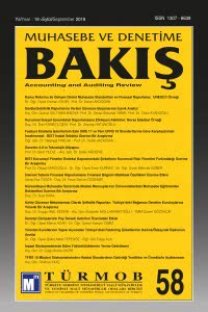PAYDAŞLARIN ÇEVRE MUHASEBESİ UYGULAMALARINA ETKİLERİ
Bu çalışmanın amacı, paydaşların çevre muhasebesi uygulamalarına etkilerini ölçmektir. Çalışma kapsamında,çevre muhasebesinin yaygın olarak kullanıldığı Birleşik Krallık’ta faaliyet gösteren konaklama işletmeleri ileTürkiye’de faaliyet gösteren konaklama işletmelerinde paydaşların çevre muhasebesi uygulamalarına etkileriincelenmiştir. Araştırmanın sonuçları göstermektedir ki paydaş gruplarından hissedarlar ve yöneticiler her iki ülkede de etkilidir. Ayrıca konaklama işletmelerinde çevresel maliyetlerin belirlenerek ayrı olarak raporlanmasında Türkiye’de toplumun, Birleşik Krallık’ta ise kredi kuruluşlarının etkili olduğu belirlenmiştir
Anahtar Kelimeler:
Çevre muhasebesi, çevresel raporlama, paydaşlar
STAKEHOLDERS` EFFECTS TO ENVIRONMENTAL ACCOUNTING APPLICATIONS
The aim of the study is to measure stakeholders` effects to environmental accounting applications. For this purpose, stakeholders` effects to environmental accounting applications has evaluated at the accommodation enterprises which are operating in the United Kingdom and Turkey where environmental accounting has commonuses. The results of the study indicate that managers and shareholders are effective in each country. In addition, society is effective in Turkey and creditors are effective in the United Kingdom to separately determiningand reporting environmental costs
Keywords:
Environmental accounting, environmental reporting, stakeholders,
___
- Akün L., “Çevre Muhasebesi: Genel Bir Bakış”, Muhasebe Bilim Dünyası Dergisi, Cilt.1, Sayı.1, (1999), s.145-155.
- Bebbington J., Gray R., Thomson I. ve Walters D., “Accountants’ Attitudes and Environmentally-Sensitive Accounting”, Accounting and Business Research, Vol.24, No.94, (1994), s.109-120.
- Deegan C. ve Gordon B., “A Study of the Environmental Disclosure Practices of Australian Corporations”, Accounting and Business Research, Vol.26, No.3, (1996), s.187-199.
- Gray R. ve Bebbington J., Accounting for the Environment, Sega Publications, Londra, 2007.
- Haftacı V. ve Soylu K, “Çevresel Bilgilerin Muhasebesi ve Raporlanması”, Kocaeli Üniversitesi Sosyal Bi- limler Enstitüsü Dergisi, Sayı.15, No.1, (2008), s.92-113.
- Hosmer D.W., Hosmer T., Cessie S.L. ve Lemeshow S., “A Comparison of Goodness-of-Fit Tests for the Lo- gistic Regression Model”, Statistics in Medicine, Vol.16, (1997), s.965-980.
- Kırlıoğlu H. ve Kasapoğlu Yıldız Ş., “Belediyelerde Çevre Muhasebesi Uygulaması”, Muhasebe ve Finans- man Dergisi, Vol.22, Nisan, (2004), s.49-60.
- Macve R., Accounting for Environmental Cost, The Industrial Green Game içinde (Editör: Richards D.), s.185-199, National Academy Press, Washington, 1997.
- Mathews M.R., “Twenty-Five Years of Social and Environmental Accounting Research: Is There a Silver Ju- billee to Celebrate”, Accounting, Auditing and Accountability Journal, Vol. 10, (1997), s.481-531.
- Miles M. P. ve Munilla L. S., The Eco-Marketing Orientation: an Emerging Business Philosophy, Environ- mental Marketing: Strategies, Practice, Theory, and Research içinde (Editörler: M. J. Polonsky ve A. T. Min- tu-Wimsatt), s.3-20, Haworth Press, New York, 1995.
- Özbirecikli M., Çevre Muhasebesi: Kavramlar Uygulama Alanları Araştırma Sonuçları, Natürel Kitap ve Ya- yıncılık, Ankara, 2002.
- Peattie K., Environmental Marketing Management Meeting the Green Challenge, Pitman Publishing, Londra, 1995.
- Smith S.M. ve Haugtvedt C.P., Pro-Environmental Attitudes and Behavior: Implications of Understanding Basic Attitude Change Processes and Attitude Structure for Enhancing Behavior, New Developments in En- vironmental Marketing: Advances in Theory, Research, and Practice içinde (Editörler: Polonsky M. and Min- tu A.), Hayworth Press, Ohio, 1995.
- Welford R., Corporate Environmental Management 1 - Systems and Strategies, Earthscan Publications Ltd., Londra, 1998.
- www.lakeheadu.ca, 2002.
- ISSN: 1307-6639
- Yayın Aralığı: Yılda 3 Sayı
- Başlangıç: 2000
- Yayıncı: TÜRMOB
Sayıdaki Diğer Makaleler
"Kar maksimizasyonu" açısından transfer fiyatlandırması uygulamalarında ekonomik analiz ihtiyacı
Kurumsal sürdürülenilirlik için muhasebe ve raporlama
SERPİL SENAL, BURCU ASLANTAŞ ATEŞ
Muhasebenin sosyal sorumluluk kavramı bağlamında ekonomik adam (Homo economicus) modeline bir bakış
Faaliyet tabanlı maliyetlemeye dayalı ekonomik katma değer analizi-enerji sektöründe bir uygulama
FAALİYET TABANLI MALİYETLEMEYE DAYALI EKONOMİK KATMA DEĞER ANALİZİ Enerji Sektöründe Bir Uygulama
Serbest muhasebeci mali müsavirlerin genel sorunları : Erzurum ili örnegi
SERBEST MUHASEBECİ MALİ MÜŞAVİRLERİN GENEL SORUNLARI: ERZURUM İLİ ÖRNEĞİ
“KÂR MAKSİMİZASYONU” AÇISINDAN TRANSFER FİYATLANDIRMASI UYGULAMALARINDA EKONOMİK ANALİZ İHTİYACI
